Key takeaways:
- Long-term application and follow-up support are essential for measuring workshop effectiveness beyond immediate satisfaction.
- Engaging participants through feedback and adaptive learning fosters a sense of community and enhances commitment to the material.
- Analyzing participant feedback in-depth reveals patterns that guide improvements and promotes meaningful dialogue around workshop experiences.
- Continuous improvement strategies include real-time feedback collection and reviewing recorded sessions to enhance future workshops.
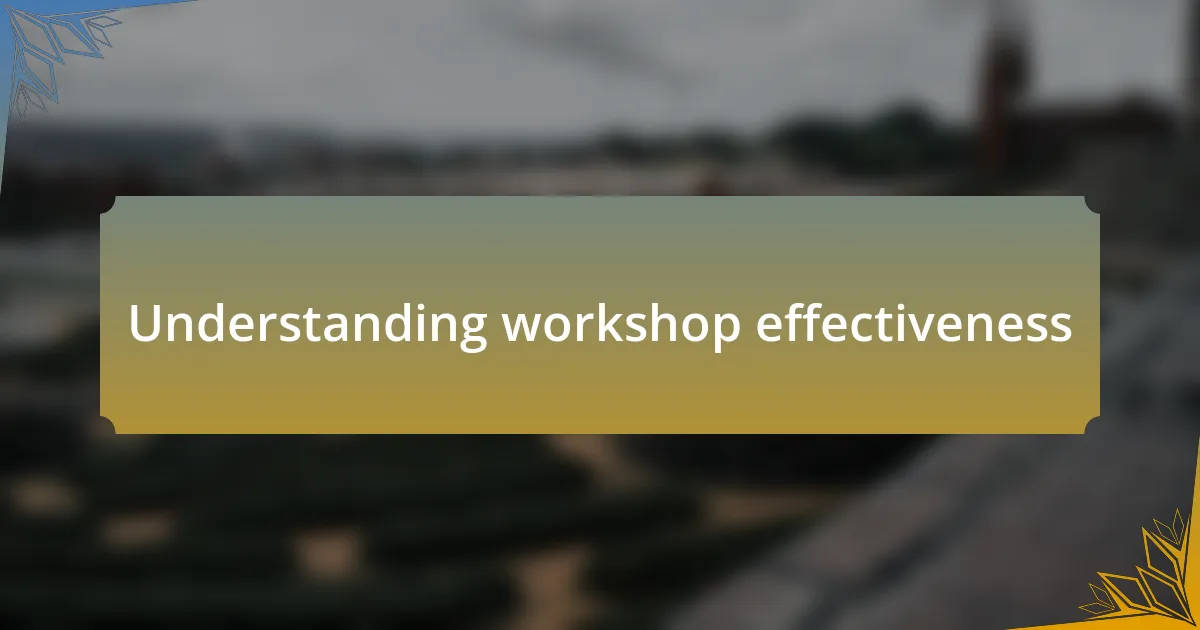
Understanding workshop effectiveness
Understanding workshop effectiveness goes beyond just looking at participant satisfaction scores or attendance rates. Reflecting on my own experiences, I’ve noticed that the real measure lies in long-term application. For instance, after attending a workshop focused on customer empathy, I found myself integrating those principles into my daily interactions, which reinforced the workshop’s value in my work.
Have you ever left a workshop feeling inspired but a week later found the excitement dwindling? This often happens when the content doesn’t translate into practical tools. In my case, workshops that provided actionable frameworks or follow-up support have had a lasting impact, guiding how I approach challenges in my field. It’s a reminder that true effectiveness is about fostering lasting change.
Moreover, effective workshops should encourage feedback and ongoing engagement. I recall a particularly impactful session where the facilitator reached out a month later to check in on our progress. That simple act reinforced the idea that effectiveness isn’t a one-time event but a continuous journey. The connection we build in these settings can often determine how we apply what we learn, allowing us to evaluate effectiveness through the lens of personal growth and application in real-world scenarios.
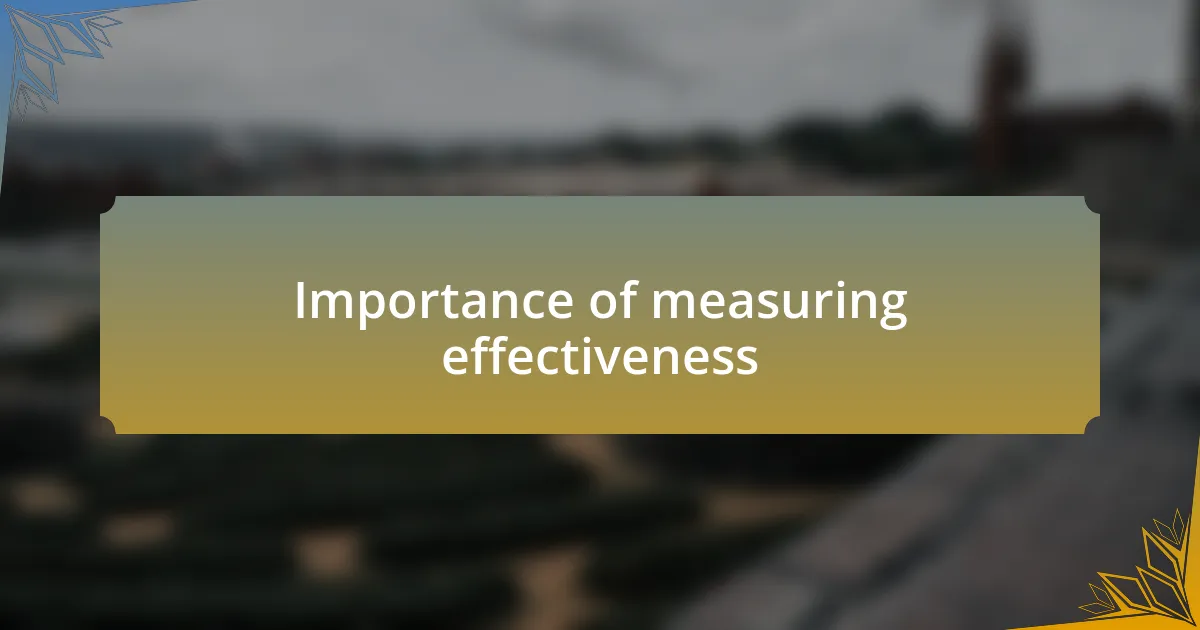
Importance of measuring effectiveness
Measuring effectiveness is crucial because it provides insights that guide future workshop designs. I remember attending a session on design thinking where the facilitator used real-time feedback to modify the agenda. This not only made me feel valued as a participant but also inspired me to engage more deeply with the content. Have you ever felt more committed to a concept simply because you had a voice in shaping the experience? Those moments are powerful, and they underscore the importance of adaptive learning.
Another reason to measure effectiveness is to ensure that tools and methodologies shared during workshops are being utilized. Once, I took part in a workshop on customer journey mapping. A few weeks later, I found myself revisiting the templates we received, applying them to my team’s project. This practical application validated the workshop’s effectiveness for me and highlighted that true impact often emerges only when participants translate learning into action.
Lastly, measuring effectiveness helps to build a community of continuous learners. I recall a workshop where the sense of camaraderie extended far beyond our time together. We formed a follow-up group, sharing struggles and successes as we implemented our learnings. Knowing others were on a similar path kept me motivated. Isn’t it inspiring to think about how effectiveness can transform not just individuals, but entire networks focused on growth and improvement?
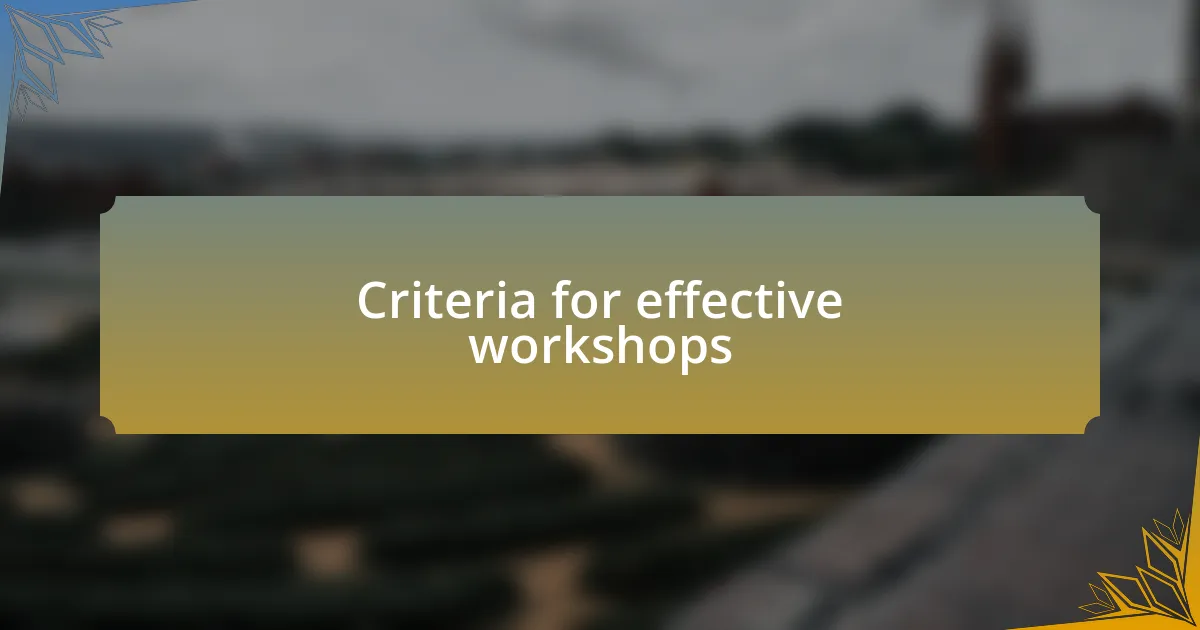
Criteria for effective workshops
When assessing workshop effectiveness, the first criterion that stands out to me is participant engagement. I remember a workshop where the facilitator divided us into small groups to tackle specific problems. The energy in the room shifted immediately; it felt like each voice mattered. Have you ever experienced that buzz of collaboration? It not only solidifies understanding but also fosters a deeper connection to the material.
Another significant factor is the alignment of workshop objectives with participants’ needs. There was a session focused on leadership skills that particularly resonated with me. The presenter asked us to share our personal goals at the beginning. That simple step ensured the content felt tailored to our aspirations. I often wonder how many workshops miss this crucial step and leave attendees feeling disconnected from the material.
Finally, the use of actionable takeaways is a key measure of success. During a marketing workshop, I appreciated how the facilitator provided us with a checklist of strategies we could implement right away. I walked out feeling empowered and ready to make changes. Isn’t it exciting when a workshop delivers tangible results? That’s what creates lasting value beyond the event itself.
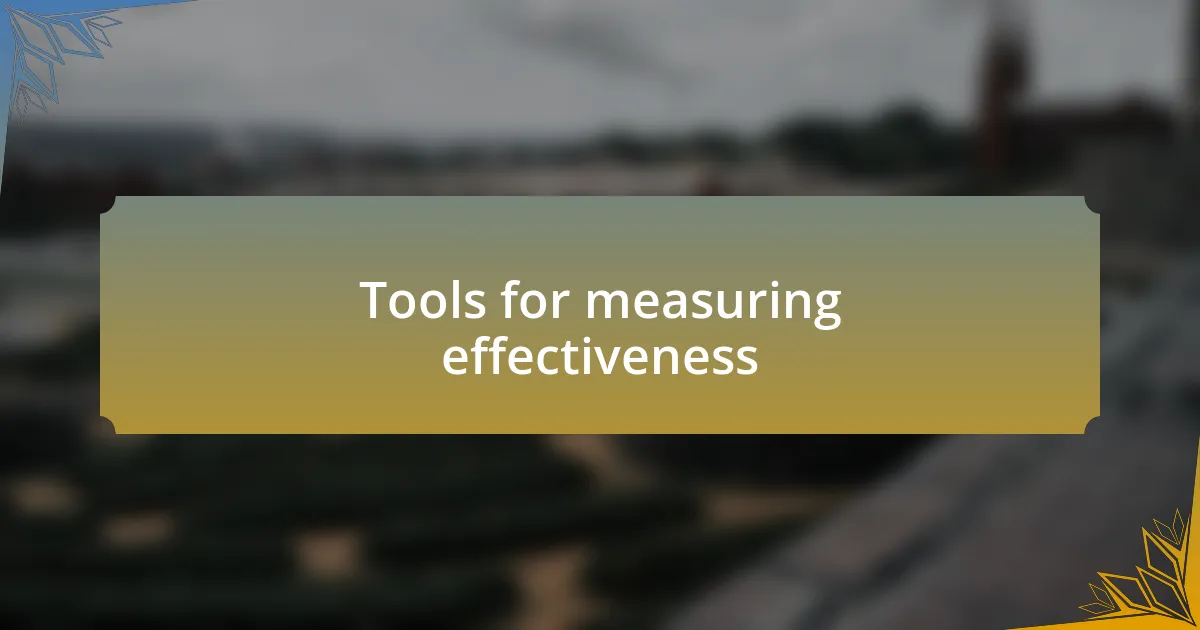
Tools for measuring effectiveness
When it comes to measuring workshop effectiveness, feedback tools are essential. I’ve often relied on quick surveys to gauge participant satisfaction immediately after a session. The thrill of seeing positive responses can be invigorating, and it’s fascinating how some simple questions can provide deep insights into what resonated with attendees. Have you ever been surprised by feedback that highlighted an aspect you thought was minor?
Another effective measurement tool I’ve found is observation. In one memorable workshop I attended, the facilitator encouraged us to observe not only the content delivery but also the audience’s body language. I recall seeing heads nodding in agreement and participants leaning forward, which indicated engagement. This qualitative analysis can reveal so much about the participant experience that numbers alone might miss. It prompts me to ask: what unspoken messages are conveyed through our interactions during workshops?
Lastly, I often turn to follow-up sessions as a way to measure long-term effectiveness. After attending a session on innovation, I initiated a follow-up meeting a few weeks later. It was inspiring to hear how colleagues applied what they learned; their stories reinforced the workshop’s impact and created a sense of community around the shared experience. Isn’t it rewarding when you see others thrive because of insights gained in a workshop?
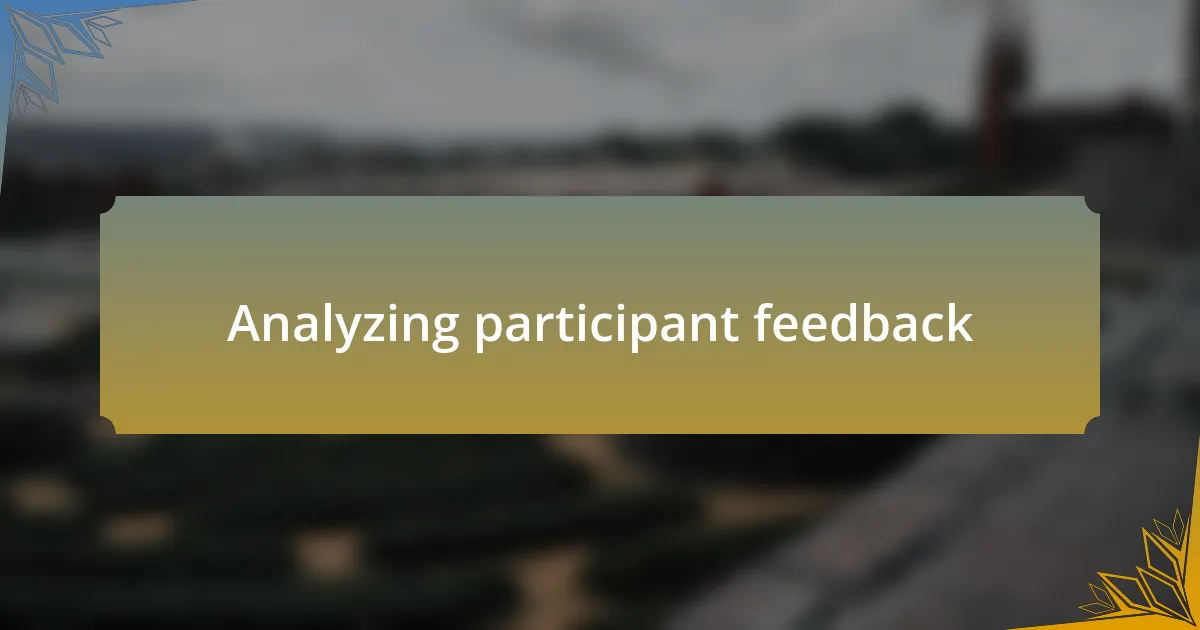
Analyzing participant feedback
Participant feedback serves as a treasure trove of insights. I distinctly remember a workshop where the responses revealed a significant divide in opinion on a critical topic. While some participants found the content life-changing, others felt it lacked depth. This contrast made me realize the importance of diving deeper into specific comments rather than simply tallying scores. How often do we overlook the nuances that tell the real story behind the numbers?
Moreover, I find that themed analysis can reveal patterns in feedback that are invaluable. After a recent workshop on customer engagement, I analyzed comments and noticed recurrent themes – ease of interaction, the presenter’s enthusiasm, and practical tools. By filtering feedback into these categories, I was able to pinpoint strengths and weaknesses. Isn’t it enlightening to see how participants’ experiences can guide future improvements in ways I hadn’t anticipated?
Finally, I believe it’s crucial to create an open dialogue around feedback. In one workshop, I invited participants to share their thoughts aloud during a debrief. The atmosphere shifted; people felt more invested, and their candid feedback brought new ideas to the surface. Engaging in this way not only enriched the feedback but also heightened their connection to the workshop’s goals. How valuable is it to foster a climate where feedback becomes a collaborative dialogue rather than just a one-sided evaluation?
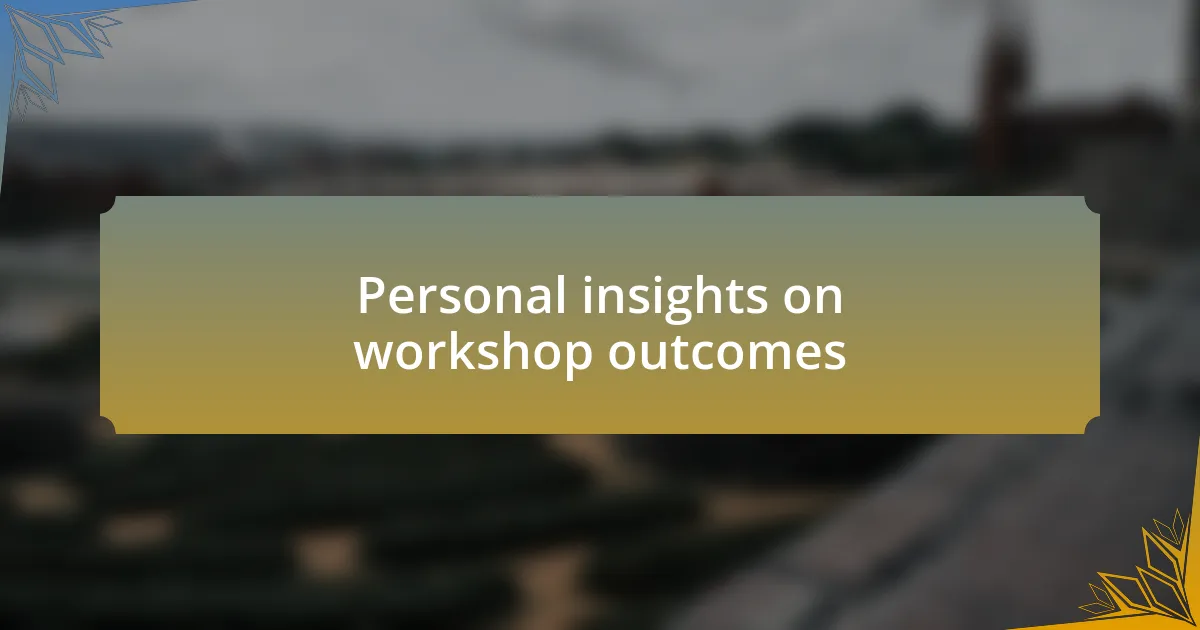
Personal insights on workshop outcomes
Reflecting on the outcomes of workshops often brings to mind a specific instance that changed my perspective. After one event, I noticed participants glowing with enthusiasm while sharing their takeaways over coffee. Their excitement reminded me that meaningful connections are just as important as the content itself. How often do we forget that the emotional energy in the room can be a powerful indicator of success?
Interestingly, I found that measuring outcomes extends beyond traditional metrics, such as completion rates. In another workshop, I took a moment to observe how participants engaged with one another during breakout sessions. Their animated discussions ignited new ideas and built camaraderie. It was evident that the collaborative energy was fueling their creative thinking. Have you ever considered how these intangible factors can signal the true impact of your workshop?
Once, I deliberately followed up with participants a few weeks post-workshop to inquire about long-term outcomes. Their responses were both eye-opening and rewarding. Several shared how they hadn’t just adopted new skills but had formed partnerships that blossomed into ongoing projects. It made me ponder—what if the value of a workshop lies not just in immediate feedback but in the lasting relationships it fosters? Each interaction holds potential, and that realization continues to shape how I approach each new workshop experience.
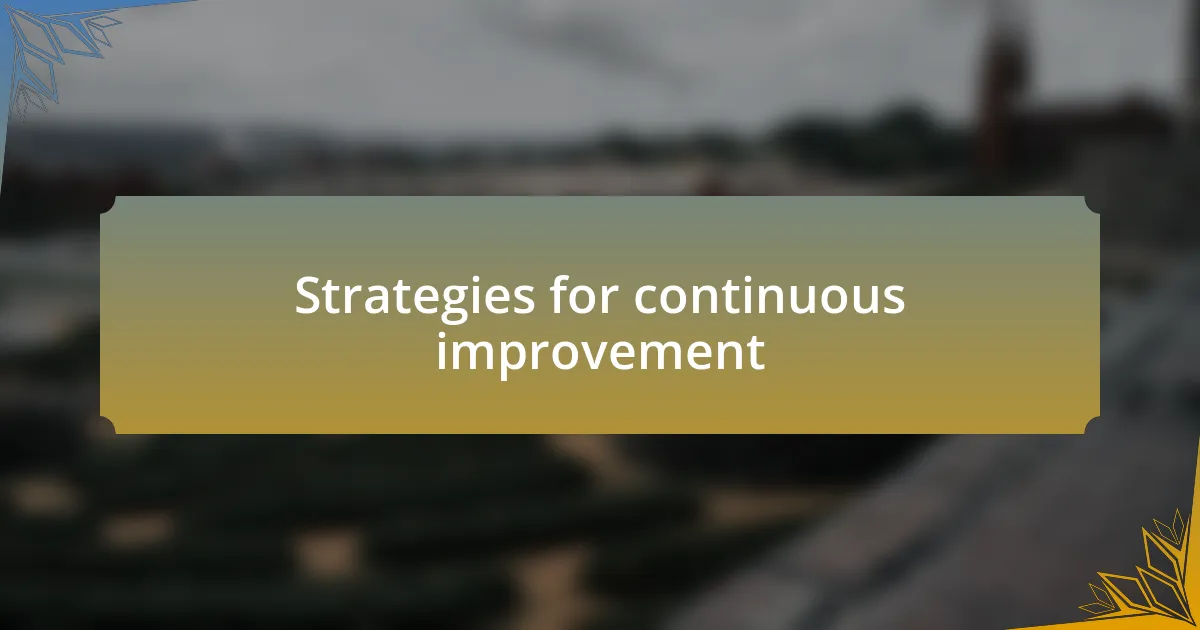
Strategies for continuous improvement
To continuously improve workshop effectiveness, I believe in regularly seeking feedback from participants right after the event. I recall one workshop where I implemented an anonymous feedback tool. The insights I received were transformative; they highlighted areas I’d overlooked, like the pacing of discussions. Have you tried gathering feedback in real-time? It can lead to immediate adjustments that enhance the experience for future participants.
Another strategy I’ve embraced is to review recorded sessions in the weeks following each workshop. I was surprised to discover nuances in audience engagement that I had missed in the moment. Watching participants interact brought new questions to mind: Were they truly engaged, or just present? This introspection urges me to refine my approach, ensuring that each workshop builds on the last, addressing any gaps.
I also make it a practice to share lessons learned with my team after every event. Collaborating on our observations fosters a culture of improvement that’s contagious. I often wonder how many facilitators miss out on this opportunity for collective growth. By discussing our experiences, we not only enhance our individual skills but also elevate the overall quality of our workshops, creating a better experience for all involved.